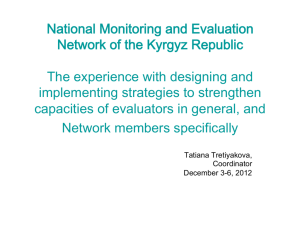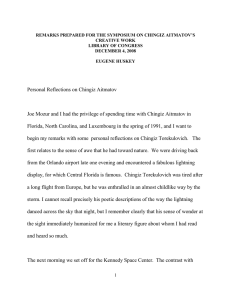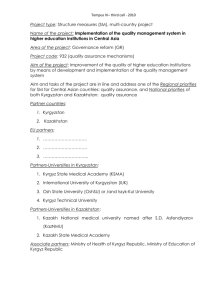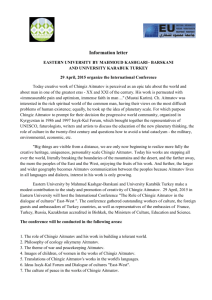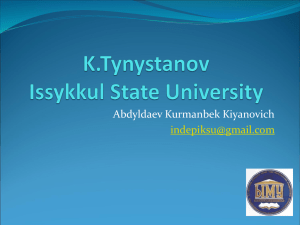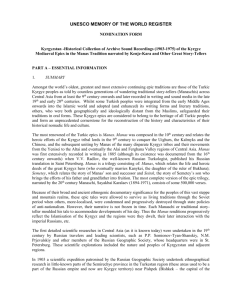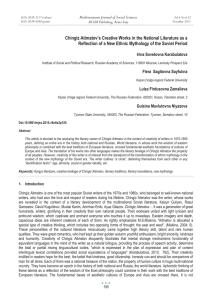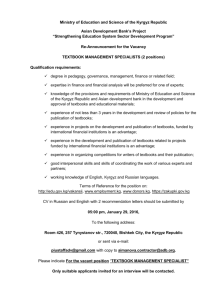Chingiz Aitmatov: A Biography
advertisement
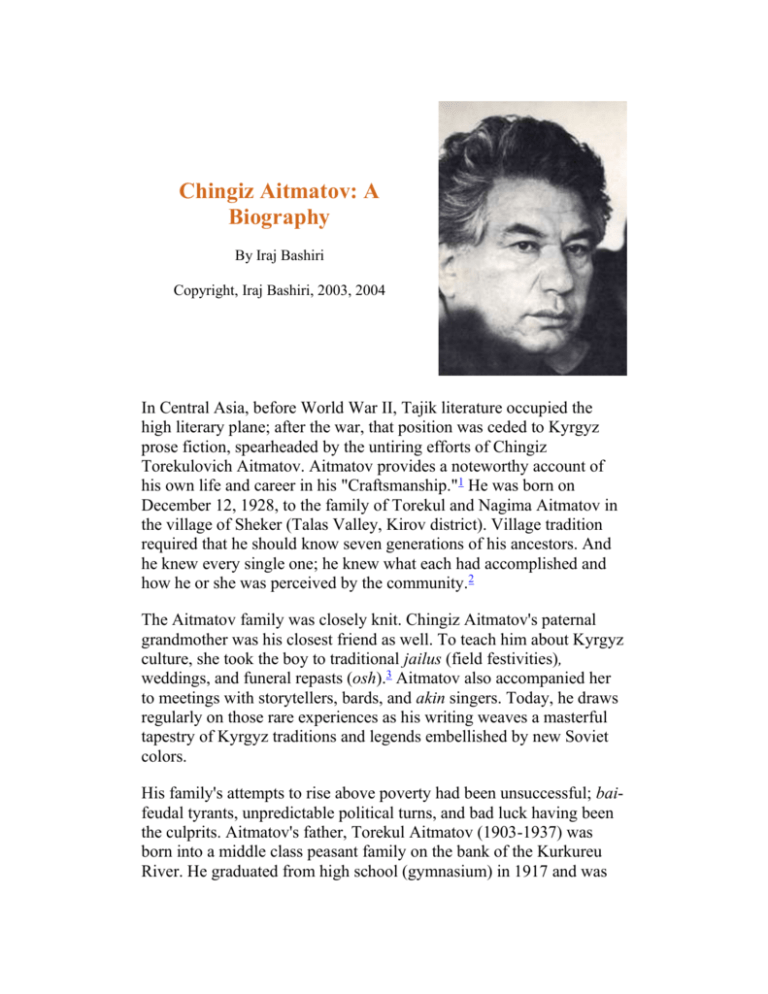
Chingiz Aitmatov: A Biography By Iraj Bashiri Copyright, Iraj Bashiri, 2003, 2004 In Central Asia, before World War II, Tajik literature occupied the high literary plane; after the war, that position was ceded to Kyrgyz prose fiction, spearheaded by the untiring efforts of Chingiz Torekulovich Aitmatov. Aitmatov provides a noteworthy account of his own life and career in his "Craftsmanship."1 He was born on December 12, 1928, to the family of Torekul and Nagima Aitmatov in the village of Sheker (Talas Valley, Kirov district). Village tradition required that he should know seven generations of his ancestors. And he knew every single one; he knew what each had accomplished and how he or she was perceived by the community.2 The Aitmatov family was closely knit. Chingiz Aitmatov's paternal grandmother was his closest friend as well. To teach him about Kyrgyz culture, she took the boy to traditional jailus (field festivities), weddings, and funeral repasts (osh).3 Aitmatov also accompanied her to meetings with storytellers, bards, and akin singers. Today, he draws regularly on those rare experiences as his writing weaves a masterful tapestry of Kyrgyz traditions and legends embellished by new Soviet colors. His family's attempts to rise above poverty had been unsuccessful; baifeudal tyrants, unpredictable political turns, and bad luck having been the culprits. Aitmatov's father, Torekul Aitmatov (1903-1937) was born into a middle class peasant family on the bank of the Kurkureu River. He graduated from high school (gymnasium) in 1917 and was elected secretary of the Committee of the Poor in 1920. Between 1924, when he joined the Bolshevik Party, and 1935, when he was sent to Moscow to study at the Institute of Red Professorship, he worked in a number of positions in the Party apparatus. In 1937, Aitmatov senior, one of the first Kyrgyz communists, a well-versed literary figure and a politician, is liquidated on charges of "bourgeois nationalism."4 Nineyear-old Chingiz, the eldest boy, copes with the shame and holds the family together. At the age of fourteen, he abandons his studies to contribute to the war effort. Aitmatov's mother, Nagima Hamzaevna Aitmatova (1904-1970), was a true product of the Soviet system. She joined the Komsomols in 1919 and served in various positions including the Head of the Department of the Karakol cantonal Komsomol Committee. In 1924, she met Torekul Aitmatov and continued her efforts at promoting women's rights, fighting illiteracy, rooting out vestiges of Islam remaining in the republic, and working to put forth land and water reforms. After 1938 until she went on pension in 1954, she worked in the Kirov Region Financial Department. Between 1943 and 1952, Aitmatov serves as the Assistant to the Secretary of the Sheker Village Soviet. During that time, he also translates Katayev's Sons of the Regiment and Babayevsky's White Birch into Kyrgyz, only to discover that both works had already been translated.5 Between 1952 and 1954, he writes two stories in Russian: "The Newspaper Boy Dzinio" and "Ashim." His first Kyrgyz contribution was "Ak Jann" ("White Rain"), which was published in 1951. Thereafter, until 1966, he works as a livestock specialist, while attending the Animal Husbandry Division of the Kyrgyz Agricultural Institute in Frunze, USSR. He then attends the Gorky Literature Institute in Moscow and takes advanced courses in literature. After graduation, he edits Literaturnyj Kirgizistan for a while and, in 1958, becomes a roving correspondent for Pravda, in Kirghizstan, a job that he holds until 1964. Aitmatov has also served as the First Secretary and Chairman of the Cinema Union of Kirghizia, Frunze, 1964-85; as the Chairman of the Writers' Union of Kirghizia, Frunze, 1985-present; and as the Editor-in-Chief of the Foreign Literary Journal, Moscow, 1988-present. Aitmatov's fictionalized accounts of the experiences he has as a young adult impart substance and direction to his fiction. Reporting for Pravda is one such experience. Odd jobs like cotton weigher, wheat harvester, livestock breeder, shepherd, tax collector, and secretary of the village council are other such examples. By bringing Aitmatov into contact with ordinary people, such experiences enhanced the veracity and credibility of Aitmatov's characters. The positions as tax collector and Secretary of the Village Council, for instance, involved Aitmatov in the intimate details of the lives of many peasants, who had to itemize for his inspection every household article they possessed.6 On October 15, 1951, Aitmatov married Keres Shamshibaev. Although the marriage produced three sons and a daughter, it did not last long. He then married Maria Urmatov (August 8, 1981). Although the Aitmatov family's home base is in Bishkek, Kyrgyzstan, Aitmatov's demanding schedule keeps him from living in Bishkek for the better part of each year. Besides, the prominent Kyrgyz writer lives a life that is not ruled as much by society as by himself. In June 1998, for instance, he decided not to celebrate his 70th birthday in December 1998; May 1999, he thought, would be a better time for holding his birthday. At the present, although a member of Kyrgyz parliament, Aitmatov lives in Brussels. Aitmatov writes in both Russian and Kyrgyz. Over the years, however, the volume of his writings in Kyrgyz has decreased. This is, perhaps, due to the fact that his own horizon has been changing, and that the philosophical and technological dimensions of his work can no longer be set by Kyrgyz audiences alone. He was awarded the Lenin Prize for Literature in 1963 for his collection of short stories entitled The Tales of Mountains and Steppes, and the State Prize in 1968 for his first novel, Farewell Gyulsary!, published in 1966. In 1978, he was distinguished as Hero of Socialist Labor. A nearly-complete list of Aitmatov's publications appears at the end of the third volume of his Collected Works.7 An adviser to Mikhail Gorbachev, President of the USSR in the early 1990s, Aitmatov has received many awards: the Gold Olive Branch of The Mediterranean Culture Research Center, 1988; the Academy Award of the Japanese Institute of Oriental Philosophy, Tokyo, 1988; and the Austrian State Prize for European Literature, 1994; and others. Aitmatov joined the Communist Party in 1959. He is a full member of the Academy of Sciences of Kyrgyzstan, a member of the European Academy of Arts and Sciences, and a member of the World Academy of Science and Arts. At the present, he is the Kyrgyz ambassador to EU, NATO, UNESCO, Belgium, Luxembourg and the Netherlands. Chingiz Aitmatov: A Brief Chronology Note: Chingiz Aitmatov's works have been published in many versions in Kyrgyz and Russian, as well as in English translation. The following is a list of his most frequently cited publications. 1928 Born 1937 Father is liquidated on charges of bourgeois nationalism 1943-52 Assistant to the Secretary of the Sheker Village Soviet; translated books 1951 Marries Keres Shamshibaev (a physician) 1952 begins his literary career 1952-66 Works as a livestock specialist; attends Kyrgyz Agricultural Institute 1954 first story written in Kyrgyz, Ak Jann, is published 1956-1958 Studies at the Gorky Literary Institute in Moscow 1958 publishes Jamila 1958-64 Correspondent for Pravda 1959 Joins the Communist Party 1963 Awarded Lenin Prize for Literature for Tales of the Mountains and the Steppes (includes "Jamila" and "First Teacher") 1964-85 First Secretary and Chair of the Cinema Union of Kirghizia 1966 Farewell, Gyulsary! Published; awarded State Prize for literature for Farewell, Gyulsary! 1967 Member, Executive Board of the Soviet Writers Union 1972 The White Ship is published 1973 The play The Ascent of Mount Fuji is produced in Moscow 1977 Wins State Prize; publishes the collection Piebald Dog running Along the Shore ( in Russian) 1978 Awarded Hero of Socialist Labor 1981 Marries Maria Urmatov; publishes The Day Lasts More Than a Hundred Years 1983 Awarded State Prize 1985-present Chairman of the Kirghiz Writers Union 1986 publishes Plakha (The Place of the Skull) 1988 Gold Olive Branch award; Academy Award of the Japanese Institute of Oriental Philosophy 1989 publishes the collection Piebald Dog running Along the Shore (includes "To Have and to Lose") 1990 Soviet Ambassador to Luxamburg 1990s Serves as advisor to Soviet President Gorbachev 1994 Austrian State Prize for European Literature See also: Articles by Iraj Bashiri: Aitmatov's Life The Art of Chingiz Aitmatov's Stories Aitmatov's Jamila: An Analysis Aitmatov's Farewell, Gyulsary!: A Structural Analysis Stories by Chingiz Aitmatov: Jamila Farewell, Gyulsary! To Have and to Lose Piebald Dog Running Along the Shore Top of the page Back to Aitmatov's Corner Home | Courses Notes: 1 For Aitmatov's autobiography, see "Chingiz Aitmatov on Craftsmanship," in Vasilii Novikov's Chinghiz Aitmatov, Moscow: Raduga Publishers, 1987. Pp. 101-182. 1 2 See, V. Novikov, p. 102.2 3 Osh is a memorial feast held after burial to lament a death. 3 4 For a biography of Torekul Aitmatov and a discussion of his political activities, see Joseph P. Mozur's "Doffing 'Mankurt's Cap': 'Chingiz Aitmatov's The Day Lasts More than a Hundred Years' as well as "The Turkic National Heritage," in The Carl Beck Papers in Russian and East European Studies, University of Pittsburgh Center for Russian and East European Studies, No. 605, 1987, pp. 6-12. 4 5 See, V. Novikov, p. 112. 5 6 See, V. Novikov, p. 111. 6 7 For a list of Aitmatov's publications, see volume three of Chingiz Aitmatov's Collected Works (in Kyrgyz). Frunze: Kirghizistan Publications, 1983. Pp. 419-420.7
